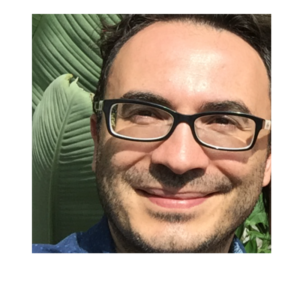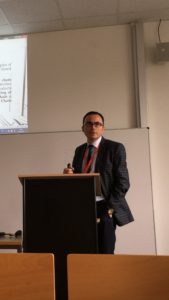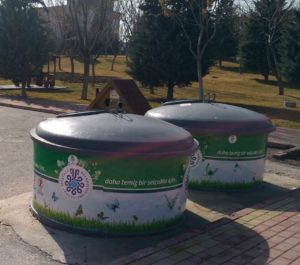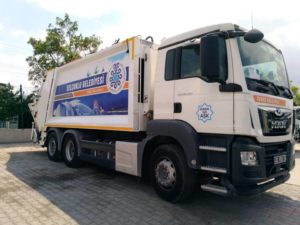Tap into the collective power of influential business and NGO pioneers to create new strategies and
tactics to build a more socially and environmentally conscious world.

Tap into the collective power of influential business and NGO pioneers to create new strategies and
tactics to build a more socially and environmentally conscious world.
Company/NGO Name:
Selçuk University
Region, Country:
Konya, Turkey

1. What is the mission of your company/NGO?
Supporting people through research and education based on scientific thinking, entrepreneurial and innovative breakthroughs for competitive advantage, social responsibility, environmental consciousness, and carrying out research with a focus on sustainable development and to constantly take care of community benefits in all its services.
2. What is the most innovative or environmentally/socially impactful project/practice your company/NGO has implemented?
I am serving as a full Professor at my university and offer consultancy services to private and public institutions. I have just accomplished a “Lean Transformation” project at Karel Electronics, the market leader in Turkey. Karel Electronics exports products and technologies to more than 30 countries and is amongst the top 15 manufacturers in the world. We used sensors, barcode readers, and LCD andons for collecting real-time data from electronic board production lines and transformed the line by following lean principles.
In today’s competitive global environment, lean and green practices have become one of the most important factors in enhancing a company’s performance. Lean and green manufacturing philosophy and techniques facilitate companies to improve their business performance in terms of reducing manufacturing lead times and costs and improving on product quality and timely delivery while becoming greener by minimizing material usage and waste and applying recycling and reuse. All these lean and green activities increase productivity, reduce carbon footprint and enhance customer satisfaction, which in turn makes companies sustainable and competitive. As a result of the Lean Transformation Project, we reduced the Manufacturing Lead Times (MLT) and eliminated the wastes including energy, material, scraps and unnecessary movements dramatically and increased the productivity by 20% at Karel Electronics (http://www.karel-electronics.com/).
3. How have those projects positively impacted the local community and/ or your country?
Before the latest project at Karel Electronics, I have completed another lean transformation project at Enkomak Co. in 2012. This project is carried out under the support of The Scientific and Technological Research Council of Turkey (TUBITAK).
The production process of bakery machines has successfully been converted to lean production principles. Approximately 1-1.5 tons of bakery machines in this product family started to work on the rail as a result of the project through the stations and according to the one-piece flow principle. With the completion of this lean transformation project, the company gained a total production area of 53.33%, a 25% reduction in labor and achieved an 83% improvement in MLT.
This project is published as a success story by TUBITAK.
(http://www.tubitak.gov.tr/tr/haber/yalin-uretim-sistemiyle-israflar-en-aza-indiriliyor).
These lean transformation projects support sustainability in accordance with the triple bottom line approach:
i- Economic impact; by increasing productivity,
ii- Social impact; generating human-centric workplaces
iii- Environmental impact; eliminating wastes and reducing material usage.
4. Please share any new projects you will be implementing in the near future.
Nowadays, I am doing consultancy for a sustainability project titled: “Design and Optimization of Smart Waste Collection System at Selçuklu (Konya) Municipality”. This project is supported by Selçuklu Municipality which is one of the largest districts; the population has more than 49 provinces in Turkey (http://www.selcuklu.bel.tr/).
The aim of this project is to create a sustainable waste system for Selçuklu Municipality by using the Internet of Things. The smart waste collection system project aims to optimize the route of vehicles according to the collected data via sensors assembled into the containers in the service area, and by this way increase customer satisfaction, decrease consumption of petrol and thus release less greenhouse gas emissions into the environment.
5. What are your top 3 career accomplishments?
I think, taking the grade of full professorship at university is the greatest career achievement for me.
Then, editing a book titled “Lean and Green Supply Chain Management” for Springer is the second.
And the third is being the Founding Director of the Lean & Green SCM Lab at KTO Karatay University in 2017. The Lean & Green Supply Chain Management Lab is an e-laboratory providing a virtual professional place for a voluntary research group dedicated to studies on lean and green supply chain research (https://lgscmlab.karatay.edu.tr/index.html).
6. What inspired you to choose your career path?
There is only one answer to this question; I love reading, searching and writing. This makes me an academician. I also love people and environment. These are basic motivations under my academic and personal interests to sustainability research.
 7. Personally—Why do you care about sustainability? What is your story?
7. Personally—Why do you care about sustainability? What is your story?
Because I do not see nature as a heritage or a market for our consumption. We are a part of nature, we will learn to live with it or we will suffer as human beings. If we care about our kids and their children, I think we have to take care of the environment and sustainability at every job we do.
8. What is/are the biggest incentive(s) for businesses in your country to adopt sustainable practices?
As in every country, increasing the consciousness level of consumers is the greatest incentive in Turkey.
9. What is/are the biggest environmental or social challenge(s) facing your country today?
The ambition of developing countries to catch up with the modern world might be lead to an understanding that sometimes nature can be ignored in the name of welfare and economic growth. This is the biggest dilemma facing developing countries.
10. What is the most positive action your country has taken to positively impact its environment or social well-being?
Turkey has become one of the fastest growing energy markets in the world over the past decade in parallel with the economic growth. I think the concrete increase in the share of renewable energy (hydro, wind, solar, and geothermal etc.) in this market is the best thing Turkey has done.
To learn more, please visit Turan on his Facebook, LinkedIn, and Twitter:
LinkedIn: https://www.linkedin.com/in/turanpaksoy/
Facebook: https://www.facebook.com/dr.turanpaksoy
Twitter: @TRNPKSY